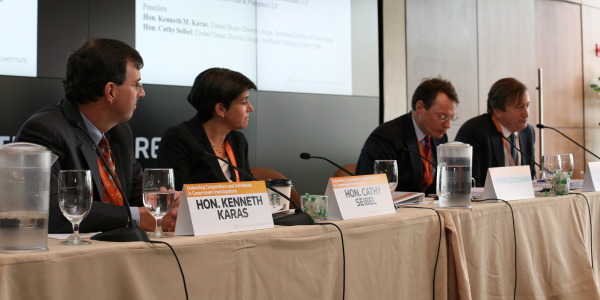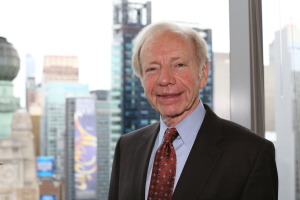
White-collar crime and advice for those called on the carpet by the federal government dominated a recent Manhattan legal conference that attracted federal judges, prominent lawyers and Connecticut”™s former U.S. Sen. Joseph I. Lieberman.
To address the changes coming for white-collar cases, defense lawyers Daniel J. Fetterman and Mark P. Goodman of Manhattan-based law firms Kasowitz, Benson, Torres & Friedman LLP and Debevoise & Plimpton LLP, respectively, hosted a legal forum at Thomson Reuters headquarters in New York City recently that centered on their book, “Defending Corporations and Individuals in Government Investigations.”
The Kasowitz link manifested itself via the presence of the firm”™s senior counsel, Lieberman, who delivered the keynote address.
The conference also attracted journalists, a panel of regulators and attorneys specializing in cases involving insider trading and Securities and Exchange Commission investigations.
Lieberman, who served Connecticut in the Senate for 24 years, represents clients in independent and internal investigations and advises them on public policy, strategic and regulatory issues.
Lieberman ”” who said the current Congress oversaw the least productive legislative session he has ever witnessed ”” addressed what factors impact a congressional investigation and its proceedings.
He said it is important and necessary for attorneys to establish a collaborative relationship with the staff of the congressional committee from the start. Otherwise, the potential exists for things to get “very bad.”
“The truth is congressional investigations are less about procedure and law than it is about public policy and public opinion,” Lieberman said. “If things go bad for a client you”™re representing before a congressional committee, it can be very bad. If a company or individual that you represent receives a notification that they”™re the target of an investigation or request for testimony or information from a congressional committee, it”™s very important for the counsel to quickly contact the staff of that committee.”
Ultimately, the attorneys can”™t stop Congress from conducting a hearing, but establishing credibility with the investigating committee could assure a friendlier reception to the staff and limit the number of hearings, Lieberman said.
“Congress possesses immense powers of publicity,” Lieberman said. “From press conferences announcing the investigation to conducting public hearings that put your client on the defensive, Congress can control the way an individual or group is perceived by the public even if no law enforcement, regulatory or legislative action results.”
Another factor, political climate, also impacts investigations. Last year, the rising political issue of the moment for the Democrats in Congress was income inequality, Lieberman said. In an address, President Barack Obama declared that the combination of increasing inequality and decreasing mobility are the “defining challenge of our time.”
“The president has influence on regulatory bodies, who in turn work with prosecutors,” Lieberman said. “So I would expect that both of those entities will continue to be active in this field, all of which makes the discussion you”™ll have today relevant and the availability of wise and effective legal counsel important as ever.”

The event featured a regulatory round table that included Aitan Goelman, director of enforcement for the Commodity Futures Trading Commission; David O”™Neil, former acting assistant attorney general for the criminal division and deputy assistant attorney general for the fraud section of the division at the U.S. Department of Justice; and Katherine R. Goldstein, deputy chief of the Securities and Commodities Fraud Task Force in the U.S. Attorney”™s Office for the Southern District of New York. The panelists spoke to holding corporate executives accountable, protecting the integrity of the market for consumers and understanding insider trading prosecutions and other fraudulent activities.
“The World Bank estimates that corruption costs the world economy $3 trillion per year, which is roughly 5 percent of the global economy,” O”™Neil said. “One trillion dollars of them are paid bribes, so that”™s going to continue to be a core priority in the Justice Department.”
O”™Neil added that cybersecurity presents a new raft of issues.
“The criminal division (of the Justice Department) just announced the creation of a cyber unit within the computer crime and intellectual property section that follows the organization in the national securities division and the reorganization along similar lines in the FBI,” O”™Neil said.
When it comes to global investigations and for those enmeshed in them, Aitan said there”™s a possibility that too many cooks could be in the kitchen.
Early and consistent communication between multiple regulatory entities is necessary for defense attorneys, Aitan said.
“When I was talking about disclosure and wanting regulatory cooperation, I meant it”™s important to keep the regulators informed about the other fronts you”™re managing,” Aitan said. “The unfortunate circumstance is where you have a regulator who is kind of lurking and at the last minute would spoil the proposed settlement.”
White Plains, N.Y.-based federal judges Cathy Seibel and Kenneth M. Karas offered perspectives on how defense attorneys can effectively present their cases and clients.
“Very few lawyers can be more coherent on their feet than in writing,” Seibel said. “I don”™t want to drag lawyers in and take their time and take my time just as a formality. So if I read the papers, and I have a feeling, and I do research, and I know where I”™m going, I don”™t have to hear their arguments.”
But the judge may still call an attorney in to make an oral argument, Seibel said. But generally speaking, it”™s best to submit a clear written document with any supporting information such as letters from those who can build the attorney”™s client”™s credibility with stories of their upbringing and character insights.
“Paint as complete a picture as you can of the person you represent,” Karas said. “In the context of their life, find evidence that says, ”˜Don”™t judge my client by 15 minutes. They serve the community and their country.”™ And there are instances where I”™ve seen people have genuinely done things, not so they could have their lawyer say, ”˜Look my client did Meals-on-Wheels last week.”™ Nonetheless, give the judge a sense of the person being sentenced. The specific instance of the person making a difference is extremely helpful.”



















